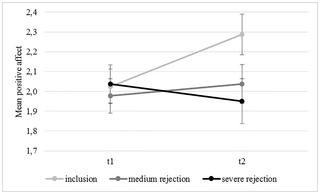Our official English website, www.x-mol.net, welcomes your feedback! (Note: you will need to create a separate account there.)
Effects of rejection intensity and rejection sensitivity on social approach behavior in women.
PLOS ONE ( IF 3.7 ) Pub Date : 2020-01-17 , DOI: 10.1371/journal.pone.0227799 Violetta K Schaan 1 , André Schulz 1 , Michael Bernstein 2 , Hartmut Schächinger 3 , Claus Vögele 1
PLOS ONE ( IF 3.7 ) Pub Date : 2020-01-17 , DOI: 10.1371/journal.pone.0227799 Violetta K Schaan 1 , André Schulz 1 , Michael Bernstein 2 , Hartmut Schächinger 3 , Claus Vögele 1
Affiliation

|
OBJECTIVE
Perceived rejection plays an important role for mental health and social integration. This study investigated the impact of rejection intensity and rejection sensitivity on social approach behavior.
METHOD
121 female participants were randomly assigned to one of three conditions differing in the degree of induced rejection (inclusion, medium rejection, severe rejection). Thereafter they were asked to interact with an unknown person during a touch-based cooperative task.
RESULTS
Participants high in rejection sensitivity sought significantly less physical contact than participants low in rejection sensitivity. Individuals in the medium rejection condition touched their partners more often than those in the included condition, while no difference between included and severely rejected participants could be observed.
CONCLUSIONS
The results suggest that the intensity of rejection matters with regard to coping. While participants in the medium intensity rejection condition aimed to 'repair' their social self by seeking increased contact with others, severely rejected participants did not adapt their behavior compared to included participants. Implications for therapy are discussed.
中文翻译:

拒绝强度和拒绝敏感性对女性社交行为的影响。
目的知觉拒绝对心理健康和社会融合起着重要作用。这项研究调查了拒绝强度和拒绝敏感性对社会态度行为的影响。方法121名女性参与者被随机分配到三种条件中,其中一种在诱导排斥程度(包括,中等排斥,严重排斥)方面有所不同。此后,在基于触摸的协作任务中,要求他们与未知的人进行交互。结果与拒绝敏感度低的参与者相比,拒绝敏感度高的参与者寻求更少的身体接触。处于中度拒绝状态的人比被包括者更频繁地触摸他们的伴侣,而被观察者和被严重拒绝者之间没有区别。结论结果表明,拒绝的强度与应对有关。处于中等强度拒绝状态的参与者旨在通过寻求与他人的更多接触来“修复”他们的社交自我,而与被拒绝参与者相比,遭到严重拒绝的参与者没有适应他们的行为。讨论了对治疗的意义。
更新日期:2020-01-21
中文翻译:

拒绝强度和拒绝敏感性对女性社交行为的影响。
目的知觉拒绝对心理健康和社会融合起着重要作用。这项研究调查了拒绝强度和拒绝敏感性对社会态度行为的影响。方法121名女性参与者被随机分配到三种条件中,其中一种在诱导排斥程度(包括,中等排斥,严重排斥)方面有所不同。此后,在基于触摸的协作任务中,要求他们与未知的人进行交互。结果与拒绝敏感度低的参与者相比,拒绝敏感度高的参与者寻求更少的身体接触。处于中度拒绝状态的人比被包括者更频繁地触摸他们的伴侣,而被观察者和被严重拒绝者之间没有区别。结论结果表明,拒绝的强度与应对有关。处于中等强度拒绝状态的参与者旨在通过寻求与他人的更多接触来“修复”他们的社交自我,而与被拒绝参与者相比,遭到严重拒绝的参与者没有适应他们的行为。讨论了对治疗的意义。



























 京公网安备 11010802027423号
京公网安备 11010802027423号